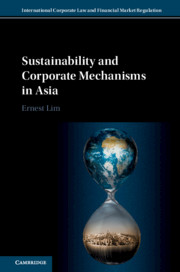‘Sustainability and Corporate Mechanisms in Asia is an important, erudite and accomplished work. It should be read by the very directors, C-suite executives, policy makers and leaders responsible for corporate social responsibility in the very companies which are the focus of his book. I recommend it without hesitation to anybody who has an interest or stake in corporations and sustainability in Asia. Because, as Lim has eloquently and persuasively argued throughout his book, there is not only a clear and positive correlation between sustainability and a company’s financial performance, but because corporate sustainability ‘is a morally good thing to do’.’
Edmund Lee
Source: Modern Law Review
'Ernest Lim has written a uniquely important and informative book on sustainability in Asia. It sets out the case for sustainability and the way in which it can be effectively implemented with exceptional clarity and insight. It will be an invaluable guide for those interested in the principles, practices and policies that should guide the adoption of sustainability in Asia.'
Colin Mayer - CBE, FBA, Peter Moores Professor of Management Studies, Saïd Business School, University of Oxford, and Academic Lead, British Academy Future of the Corporation Programme
'In this important contribution, Professor Ernest Lim shifts the academic debate about corporate sustainability from a focus on corporate actors and their behavior to a focus on corporate governance and legal mechanisms. The book identifies six such mechanisms - sustainability reporting, board gender diversity, constituency directors, stewardship codes, director duties, and liability - and provides a comprehensive, clear, and cogent analysis of their use in Hong Kong, India, Malaysia, and Singapore. Professor Lim also draws broader lessons about these mechanisms for corporate governance, including the role of state-owned enterprises and controlling shareholders.'
Frank Partnoy - Adrian A. Kragen Professor of Law, University of California, Berkeley School of Law
'The obligations of businesses to play a leading role in addressing our global climate crisis are increasingly pressing. Yet the scope and contours of those obligations remain ill-defined. Professor Lim’s careful and thorough work brings precious clarity. His work will be helpful and enlightening to scholars, business leaders, governments, and NGOs across Asia - and beyond.'
Kent Greenfield - Dean’s Distinguished Scholar, Boston College Law School
'Professor Lim's highly original work adds important nuances to the ongoing debates through its convincing demonstration that the common law family is a far more heterogeneous group in respect of corporate sustainability than assumed by advocates of the 'legal origins matter' thesis … His rich and nuanced account of how these mechanisms have intertwined and interacted with broader institutional conditionalities in the four jurisdictions in addressing the sustainability question is solidly grounded in the comparative literature while revealing a distinctive Asian perspective. Importantly, the case studies offer fresh comparative insights with implications that go beyond the four surveyed jurisdictions.’
Xi Chao
Source: Journal of Comparative Law



